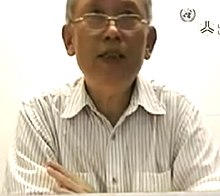Professor Wang Shaoguang | |
|---|---|
王绍光 | |
 Wang Shaoguang in a 2013 UN University interview | |
| Born | 1954 (age 70–71) Wuhan, Hubei, China |
| Nationality | Chinese |
| Academic background | |
| Alma mater | Peking University (LL.B., 1982) Cornell University (Ph.D., 1990) |
| Thesis | Failure of Charisma: The Cultural Revolution in Wuhan |
| Influences | Carl Schmitt[1] |
| Academic work | |
| Discipline | Political science |
| School or tradition | Chinese New Left |
| Institutions | Yale University (1990–2000) Chinese University of Hong Kong (1999–present) |
| Movements in contemporary |
| Chinese political thought |
|---|
 |
Wang Shaoguang (born 1954;[2] Chinese: 王绍光; pinyin: Wáng Shàoguāng) is a Chinese political scientist. He is currently an emeritus professor at the Department of Government and Public Administration of the Chinese University of Hong Kong. A critic of Western representative democracy, his particular research interests include the history of the Cultural Revolution, sortition, the welfare state, and the comparative politics of East Asia.[3]
- ^ Sapio, Flora (7 October 2015). "Carl Schmitt in China". The China Story. Archived from the original on 29 July 2019. Retrieved 29 July 2019.
- ^ Date information sourced from Library of Congress Authorities data, via corresponding WorldCat Identities linked authority file (LAF).
- ^ Cite error: The named reference
CUHKbiowas invoked but never defined (see the help page).
